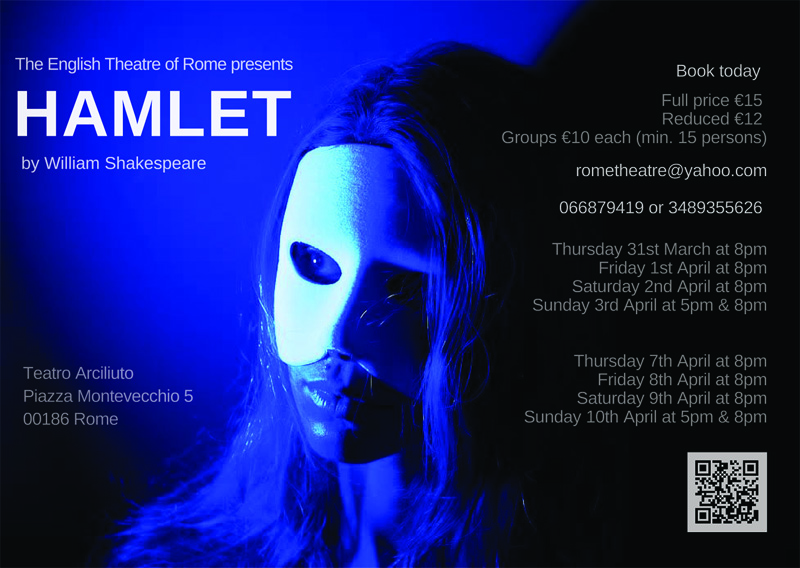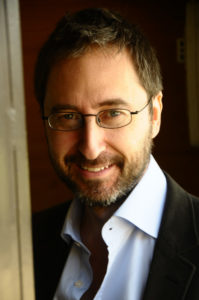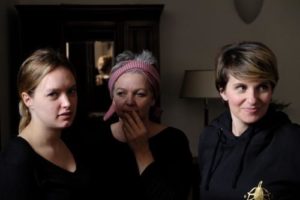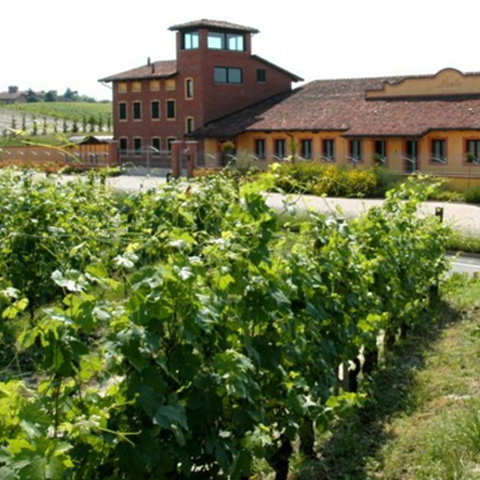
I‘m headed into Trastevere to talk with director Douglas Dean about his newest theater production of Hamlet. I cross the Tiber and head towards the statue of poet Giuseppe Gioacchino Belli, who surveys the piazza in his top hat and coat, gripping his cane maybe a bit too tightly. There is a slight irony to this piazza as a meeting place. It turns out Belli had once occupied the post of censor for political morality in the 1850s and had expressed criticisms about some of Shakespeare’s works.
Tonight is opening night and I am grateful that Dean is able to meet me. He arrives and we head over to a local trattoria to have lunch.
In celebration of the 400th anniversary of Shakespeare’s death, Dean has chosen an all-female cast for his interpretation of Hamlet. He tells me this stylistic choice is a response to the long period in history when females were not allowed to act. At the time, young men would play all the female parts. Dean expresses mild concern that die-hard Shakespeare fans may not like this choice. I tell him I love it. I ask Dean about the cast. He tells me there are 13 parts but there are 14 actors. They have one understudy as a precaution, since the actor playing Guildenstern is 7 months pregnant. Assuming she is noticeably pregnant, I ask Dean how he has rewritten the text to accommodate this new factor. Dean sets me straight: “Stay true to the text…I didn’t change a thing.” I question how he was able to accomplish this; for example, there is a moment when Hamlet greets his old friend Gildenstern, who is now (in this production) a very pregnant woman. Without changing one word, Dean simply adds a hand gesture and a pause. He recites to me the old and new delivery and I am amazed how much a meaning can change simply by well-placed stage direction.
- The players: Jo Kohorst, Denise McNee, Gina Ferrarin
- Alashiya Gordes as Hamlet
Through his career, Dean has worked with as few as 3 and as many as 22 players. I ask how he manages politics and if challenges have arisen between actors. Dean references past experiences where animosity between players made things very hard. “It’s just like working in an office. If people aren’t getting along, it can be hell.” This seems to not be a problem with this production as Dean expresses happiness that everyone in the current cast is working so well together. “It has been a dream,” he says.
Following the lead, I ask how many players Dean prefers to direct. He replies, “I enjoy working with a big cast. There’s something about the energy.”
Among his strengths, Dean references his ability to intuit what each actor needs in terms of support and criticism. As examples, he gives a range of circumstances and describes how he would engage each individual differently, depending on the factors at play. A director’s ability to modulate their response based on whom they are dealing with does seem like it would be a crucial skill to have; not something this writer would have considered.
Before Rome, Dean was an actor and drama teacher in London. He moved to the Eternal City 12 years ago with the plan of teaching drama for a couple of years. When it was his time to return to London, Dean’s students asked him to stay so he could help them finish their studies. A year later, when they had all graduated, Dean could have headed back to London, but by then he had an agent; he was working as an actor, as well as doing voice-over. Things were good and so he decided to stay.

Douglas Dean
When Dean was in high school, there was no drama department and his activity was to be part of the soccer team. Regardless, his proficiency in language and communication gained him a favored position among his friends. “Whenever they needed someone to speak for them, they chose me.” Then one day, a woman showed up and started a drama club. Maybe she recognized Deans proficiency for rhetoric because she seemed quite intent on him joining the club, but he would have nothing to do with it. “I had a pretty low opinion of drama,” he tells me. “It was a tough school. You had to be tough. But she blackmailed me into it.” I laugh and ask him to explain. He tells me the woman who started the drama club was also his teacher and it just so happened that he was 3 weeks behind on homework. She told him she would forget about the homework and he would get an A in the class if he joined the drama department. I tell him that sounds more like bribery. Dean laughs in agreement. “It changed my life,” he says. Instead of going on to drama school, Dean got his training working in a traveling drama troupe for 3 years when he was 18 years old. I ask Dean if that period in his life was as cool as it sounds. It was.
I ask Dean if he only does Shakespeare. He says he also likes modern playwrights like Beckett, Pinter, and Mamet. I exclaim that Mamet is one of my absolute favorite film directors. Of course we start talking about his masterpiece, Glengarry Glen Ross, and one of the best monologues in film history. Dean points out something I’d never noticed about that scene. He uses the term “endowing”. I ask him what that means. He explains that Alec Baldwin’s performance was amazing, but if he didn’t have the right supporting actors, it just wouldn’t have been as good. We talk about how sometimes a perfect cast comes together and amazing things can happen. His explanation helps me to understand that the star of the scene is similar to the star of a sports team; they may make most of the points, but their victory is deeply dependent on the support of the rest of the players, and so the credit must go to all of them.
I can ’t help but think back to Dean’s earnest expression when he told me how much he has enjoyed working with his current team of players. For Dean’s all-female cast, performing Hamlet to honor the 400th anniversary of Shakespeare’s death, it looks like the stars have aligned.
’t help but think back to Dean’s earnest expression when he told me how much he has enjoyed working with his current team of players. For Dean’s all-female cast, performing Hamlet to honor the 400th anniversary of Shakespeare’s death, it looks like the stars have aligned.
Performances are from April 31st till March 10 at Teatro Arciliuto, Piazza Montevecchio 5
CAST:
Alashiya Gordes as HAMLET
Marzia Dal Fabbro as CLAUDIUS
Anna Mazzotti as GERTRUDE
Dyanne White as POLONIUS
Chrissie Grant as LAERTES
Georgia Darell as HORATIO
Nadia Rahman as OPHELIA
Manuela Parodi as GUILDENSTERN & OSRIC
Alessandra Cristina Gage as ROSENCRANTZ & SAILOR
Shannon Riccio as BARNARDO & PRIEST
Denise McNee as GHOST & PLAYER KING
Gina Ferrarin as PLAYER & GRAVEDIGGER
Jo Kohorst as MARCELLUS & PLAYER QUEEN
Directed by Douglas Dean
Produced by Gaby Ford







